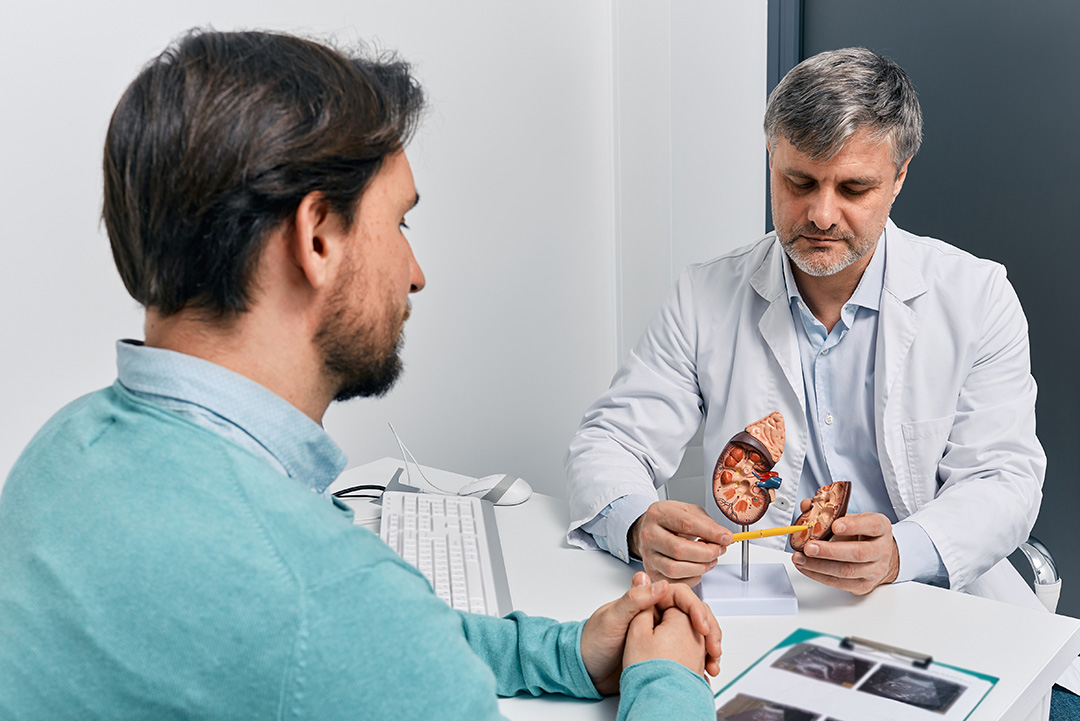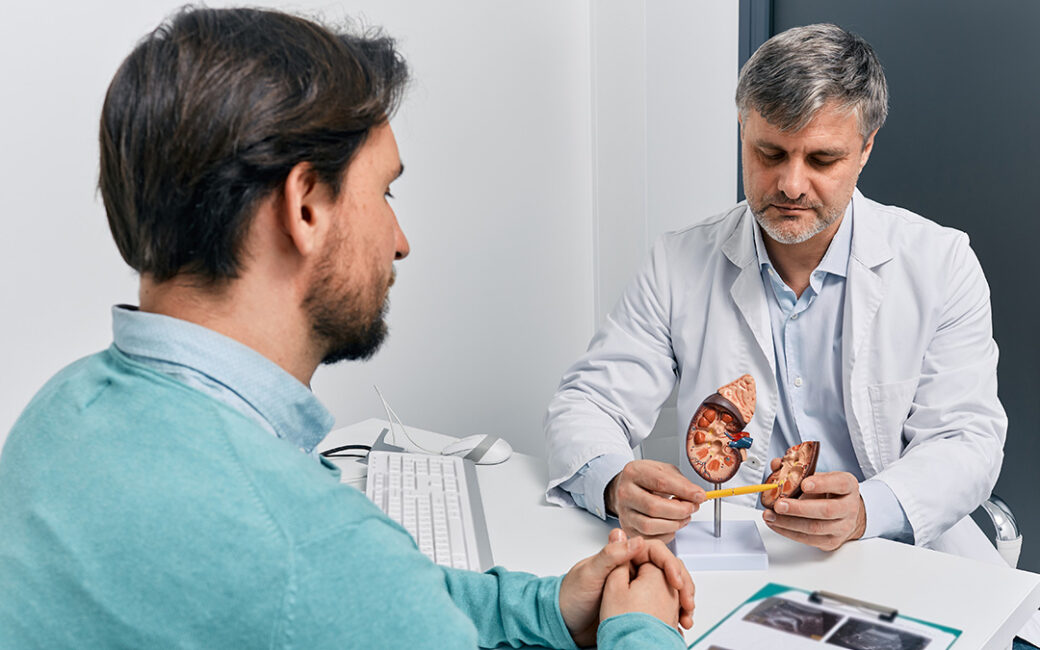Comprehensive Guide to Nephrology Services
What to Expect, When to See a Specialist, and How to Prepare

Table of Contents
- Understanding Kidney Function and Nephrology
- What Conditions Do Nephrologists Treat?
- When to See a Kidney Specialist
- What Happens at a Nephrology Appointment?
- Patient Education: Managing Chronic Kidney Disease (CKD)
- Dialysis and Transplant Options Explained
- How to Prepare for Kidney Care Decisions
- Support Services for Kidney Patients
- Common Questions and Answers
- Connect with a Specialist in Southeast Wisconsin
1. Understanding Kidney Function and Nephrology
Your kidneys do much more than filter waste. They regulate blood pressure, control fluid and electrolyte levels, produce hormones, support red blood cell production, and help maintain strong bones.
Nephrology is the medical specialty focused on kidney care and the conditions that affect kidney health. When your kidneys begin to lose function, a condition known as chronic kidney disease (CKD), you may not notice symptoms right away. But understanding what kidneys do and how they are affected by conditions like diabetes and hypertension is an essential first step in taking charge of your health.
2. What Conditions Do Nephrologists Treat?
Kidney specialists diagnose and manage many conditions beyond dialysis and transplant care. These include:
- Chronic Kidney Disease (CKD) and End-Stage Renal Disease (ESRD)
- Acute Kidney Injury (AKI)
- Diabetic kidney disease
- Hypertension and hypertensive-related kidney disease
- Glomerulonephritis and other autoimmune disorders
- Electrolyte and mineral imbalances
- Inherited conditions like polycystic kidney disease
- Kidney stones and recurring infections
If you live in Milwaukee, Waukesha, or other parts of Southeast Wisconsin and are experiencing symptoms or managing chronic conditions, early nephrology care can help prevent serious complications down the road.
3. When to See a Kidney Specialist
You don’t have to wait until your kidneys are in crisis to see a specialist. In fact, earlier is better. You should schedule a consultation if:
- Your GFR is consistently below 60
- You have persistent protein or blood in your urine
- You’re living with uncontrolled diabetes or high blood pressure
- You have a family history of kidney failure or inherited kidney disease
- You are planning for dialysis or transplant care
Many patients are referred to nephrology after routine lab work reveals a drop in kidney function. If you're not sure whether it’s time, talk to your primary care provider or contact a nephrology office in your area.
4. What Happens at a Nephrology Appointment?
During your first visit, your provider will take time to understand your full health picture. Appointments typically include:
Reviewing your medical history and current medications
- Examining lab results like GFR, creatinine, and urine protein levels
- Checking your blood pressure, heart, and any signs of swelling
- Discussing lifestyle, diet, and symptoms
- Creating a plan for monitoring, treatment, or further testing
You may also discuss long-term planning, especially if your kidney function is declining. This might include scheduling imaging, vein mapping, or education about dialysis and transplant options.
5. Patient Education: Managing Chronic Kidney Disease (CKD)
Education is one of the most important tools in slowing CKD progression. Patients who understand their stage of disease, lab results, and care options often experience better outcomes.
What to Know About CKD Stages
- Stage 1 and 2: Kidney damage with normal or mildly reduced function
- Stage 3: Moderate loss of function which is often where symptoms begin
- Stage 4: Severe reduction, preparation for dialysis may begin
- Stage 5: Kidney failure, dialysis or transplant needed
Managing Your Health
- Follow a kidney-friendly diet low in sodium, phosphorus, and potassium
- Keep blood pressure and blood sugar in check
- Take medications as prescribed
- Ask about anemia, bone health, and electrolyte monitoring
- Stay active and maintain a healthy weight
- Avoid over-the-counter medications that may harm your kidneys
Working with a local care team in Southeast Wisconsin means your treatment plan can evolve with your needs, with in-person support available when questions arise.
6. Dialysis and Transplant Options Explained
When kidney function declines significantly, dialysis or transplant is often necessary. Your nephrologist will help guide the timing and best approach for your situation.
Hemodialysis
- Can be done in a dialysis center or at home
- Uses a machine to clean your blood through a vascular access
- In-center: typically three times per week for several hours
- Home: often more frequent (about five times per week) but shorter sessions
Peritoneal Dialysis (PD)
- Done at home using a catheter placed in the abdomen
- Uses the body's own peritoneal lining to filter waste
- Allows greater flexibility with fewer dietary restrictions
Kidney Transplant
- Involves placing a healthy kidney from a living or deceased donor
- Often preferred for long-term quality of life
- Requires surgery and ongoing use of anti-rejection medications
If you're in Milwaukee or nearby areas, ask your care team about transplant evaluation options and whether home dialysis may be right for you.
7. How to Prepare for Kidney Care Decisions
Being proactive means fewer surprises and more control over your care. Here’s how to start:
- Schedule vein mapping early if dialysis may be needed
- Discuss dialysis access options (fistula, graft, catheter)
- Consider advance care planning and discuss your long-term goals
- Explore home dialysis options, including PD and home HD
- Ask for a referral to a dietitian or social worker
- Speak with insurance coordinators to understand coverage
Planning ahead can help you feel confident, prepared, and supported when care needs become more complex.
8. Support Services for Kidney Patients
You don’t have to navigate kidney disease alone. Across Southeast Wisconsin, patients have access to:
- Kidney Care Advocates who offer education and one-on-one guidance
- Patient and Insurance Coordinators to help with referrals, billing, and approvals
- Community resources that connect you to food, housing, and transportation help
- Support groups and wellness programs for managing stress and building community
These services work alongside your medical team to ensure that you’re supported in every aspect of care, from physical to emotional to financial.
9. Common Questions and Answers
Q: When does kidney disease become serious?
A: It becomes more serious in stage 3 or later. Many patients don’t feel symptoms until kidney function drops significantly, which is why regular labs and early referrals are so important.
Q: What are early symptoms of kidney problems?
A: Swelling, fatigue, foamy urine, high blood pressure, and changes in urination are common. However, many people don’t experience symptoms in the early stages of CKD.
Q: Will I need dialysis?
A: Not necessarily. Many people manage CKD for years without needing dialysis. Your care team will monitor your kidney function and help you plan if treatment becomes necessary.
Q: What’s the difference between a fistula and a catheter?
A: A fistula is a durable access made from your own blood vessels. It’s safer and longer-lasting. A catheter is a temporary tube often used in emergencies—it carries a higher risk of infection.
Q: Can I travel or work while on dialysis?
A: Yes. Many patients continue working or traveling. Home dialysis and evening center schedules can offer more flexibility.
Q: Is transplant better than dialysis?
A: In many cases, yes. Transplant offers better long-term outcomes and quality of life, but not everyone is eligible. Your care team will help you understand your options.
For more answers, talk to your provider or explore our patient education resources on dialysis and transplant care.
10. Connect with a Specialist in Southeast Wisconsin
Whether you’re in Milwaukee, Waukesha, or elsewhere in Southeast Wisconsin, finding the right nephrologist is the first step toward proactive kidney care.
We offer flexible scheduling, multiple clinic locations, and both in-person and virtual visits depending on your needs.
Your Path Forward
Living with kidney disease is not easy, but with the right care, education, and support, it is manageable. This guide is designed to help you take informed steps toward protecting your kidney health. From understanding your GFR to planning for future treatments, you now have the information you need to ask better questions, make confident choices, and stay engaged in your care.
If you’re ready to take the next step, whether that means getting your lab results reviewed, learning more about dialysis options, or preparing for a kidney transplant, reach out to a kidney care specialist near you. We are here to support you at every stage and every step.
